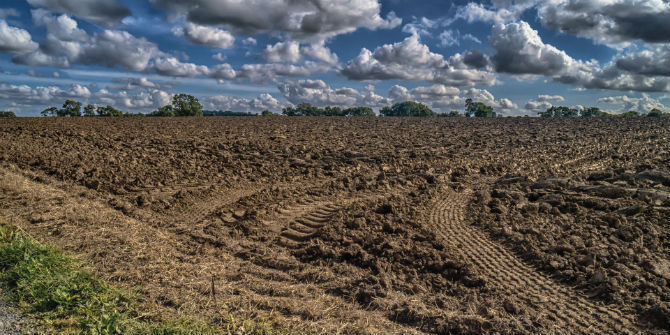A new focus on environmental stewardship and animal welfare in the Agriculture Bill has pleased some conservationists. But British farmers will probably now have to compete on price with agribusinesses in the US. Richard Byrne (Harper Adams University) asks whether the new subsidies will be enough to keep smaller UK farms afloat.
The long-awaited Agriculture Bill was published on 16 January 2020. It will replace the Common Agricultural Policy (CAP) as the UK leaves the EU, a policy which has long been maligned for encouraging over-production and damage to the environment. While it has changed substantially since the 1990s, it remains a large and bureaucratic system, bemoaned by farmers and criticised by environmentalists.

The bill is a radical step. It seeks to redress the core environmental issues of the CAP and further link farming and the environment, with the aim of promoting long term sustainability, or at least environmental stability. Farmers will no longer be paid for owning and managing land to a certain level. Instead they will be rewarded for delivering a range of ‘public goods’, including climate crisis mitigation, flood protection, improving wildlife habitats, and protecting soil.
It is the latter that it perhaps the most radical element of the new bill. UK farming has for many years had a ‘Code of Good Practice’ for protecting water, soil and air, which has had little impact on soil erosion and degradation in the UK. Soil is key not only to agricultural production, but water and ecosystem management, and the bill will promote and ‘reward’ the protection and improvement of soil quality.
The new ‘Environmental Land Management Scheme’ (ELMS) under which the new aims will be delivered is similar to the existing ‘Stewardship’ programme, but indicates it will work at a larger and more integrated land management scale and well as incorporating key areas such as animal welfare and public access. In short, the new bill brings together a raft of objectives from CAP and domestic legislation and is an ambitious attempt to make food production environmentally, animal and consumer friendly.
While some immediate issues about its implementation and the transition period have been raised, the bill’s aims have been generally well received by both farming and environmental organisations. It is clear that integrated land management is the way forward and the bill recognises the positive role food production plays in conservation. It also builds upon the lessons of ‘Stewardship’, and hopefully there will be a natural progression for farmers as they are phased into the ‘land management’ objectives.
However, it does all depend on having a viable and functioning agricultural system. The UK’s agricultural landscape is one based upon a range of farming types from small family owned units, tenant farmers to larger family-owned farming businesses and very large agribusinesses, many of which are international in nature. Each of these businesses has played a part in the development of the rural landscape, the rural economy and the sustaining of the present environment, and as such are integral to the delivery of the bill’s aims.
Given the government’s stance on aligning trade and regulation with the EU and its ambition to make a ‘quick’ trade deal with the US, the economic viability of many farming units – particularly the smaller ones, which often have high environmental or landscape interest – may be under threat. The new bill sets out high standards for UK production and even with support these will most likely increase the cost of production. Because the EU has common regulations, the cost differential is generally down to factors such as land prices, labour and inputs. Now, UK production will potentially be competing with food produced in countries (such as the US) with different standards of animal welfare, environmental management or able to use production methods banned in the UK, all of which will make those products cheaper. At the same time UK farmers will lose access to the single market, which is important for both whole products and the value-added food trade. UK farmers will therefore have to compete with cheaper food imports while losing export markets. This will also affect consumer choice in the UK. While many consumers say they want to buy products produced with environmental oversight, the reality is that most are driven by price. The result could be many UK farm businesses going bust or being swallowed up by larger units where the appeal of the Agriculture Bill payments will be less compelling.
So while the UK will continue to produce food, the environment and landscape may shift to a more efficient and industrial-type model. To counter this, the National Farmers Union has called for legislation that would prevent the import of food produced to lesser standards than that in the UK. This is unlikely to be successful as it would be a barrier to free trade, and the US (among others) would surely object.
The UK now has an agricultural policy which – in its outline form – has to an extent succeeded in bringing together both agriculturalist and environmentalists. However, there is still much detail to add to the bill. Most worryingly for rural communities, and for consumers, is that the future of UK agriculture is now locked in a wrangle between domestic policy and future trade relationships, with the UK’s biggest potential trading partner, the US, unable or unwilling to address production standards or the climate crisis in its negotiations.
This post represents the views of the author and not those of the Brexit blog, nor LSE.





This is a very interesting article and I agree with much of it, particularly the concerns about trade relationships. I also welcome ELMS in principle, although the devil is in the detail. However, can we abandon efficiency objectives altogether given low agricultural productivity? It is a point of debate whether larger units are more efficient, particularly given that many large arable units are now non-contiguous which imposes both management and environmental costs. However, there is some evidence that larger units have higher standards of animal welfare in the livestock sector. I am particularly concerned about remote farms in hill areas which often have fewer diversification opportunities to offset declining farm income. The Scottish and Welsh governments may seek to tackle this issue, if they can find the funds.
The devil is indeed in the fine print and details yet to be determined. As usual, whichever has the most political influence will get the goodies. The Farmers Union will make the right noises, but any influence it has to bring to bear on this as on other issues will be used to advance the interests of them that have the most say behind the scenes. For this to be any other way, better, more equitable, there would have to be a drastic change of culture in English society. England sets the tone in sociopolitical, cultural and commercial practices. Those farmers which have been relying on the EU regime to get by, and have not taken any notice of a change in the wind the last four years, will be discomfited.
Food imports from the EU should be cheaper, but may need to be routed through other non-EU countries as long as the EU plays hardball. Rump UK farmers will have to compete with cheap imports from non-European countries and will find soon enough to which extent Westminster is prepared to protect quality in the face of ever present political pressure for cheaper food. Other than farmers, there is hardly any people with political influence who do not want cheaper food. Cheap food means more money for everyone bar farmers. It keeps a cap on wage demands, allows more for paying rent, taxes, non-food consumables, holidays, alcohol, etc., etc. However, if farmers come to rely on hand-outs from the taxpayers to satisfy an impossible mix of demands from all quarters, they will become paid stewards prey to the whims of the a host of emotive and fanciful notions about what the countryside should look like and do as well as sensible environmental options.
One can diversify only so much. It has to pay within a reasonable time frame. Small holdings, imo, are a lifestyle and a means to ensure survival of the smallholdings’ stakeholders. What with the ongoing bureaucratic strangulation of everything and everyone not connected to the transnationals and the establishmentarians which serve them survival is the name of the game, for farmers, small to medium-sized businesses and everybody else below a certain socio-economic level of functioning.